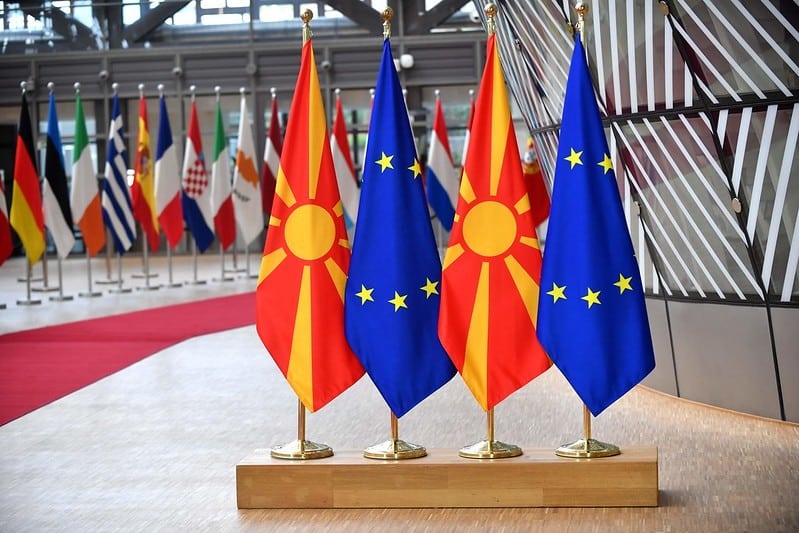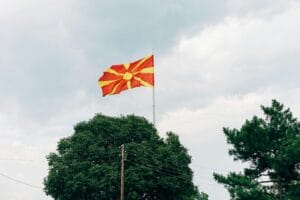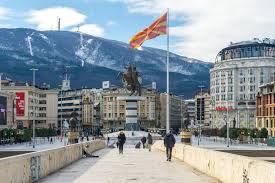Reception during President Zaev’s visit to Brussels (Source: Flickr)
With many obstacles preventing North Macedonia from joining the EU, eurosceptic nationalist parties are once again trying to erect another hurdle. This time the relatively small Levica Party is seeking to hold a referendum against the Friendship Treaty with Bulgaria, after a previous referendum by main opposition party VMRO DPMNE was rejected earlier this month.
Friendship treaty with Bulgaria
EU accession of North Macedonia has been far from smooth. The Prespa agreement with Greece and the following name change in 2019 was needed to settle a long-running dispute and eventually lifted Greek objections to EU and NATO accession of North Macedonia. However, EU accession still found itself threatened by a Bulgarian veto, as Sofia demanded that their concerns about the Bulgarian language and history were taken into account. Bulgaria’s position was explained through distributed documents to other member states in which it was stated that Bulgaria cannot “accept that the still ongoing nation-building process in the Republic of North Macedonia be conducted through the revision of our common history, the denial of our common ethnic and linguistic roots or the unfounded claims for the existence of a ‘Macedonian minority’ in Bulgaria.” Both countries already signed a “Friendship Treaty” back in 2017 as a resolution to the issue, but Bulgaria expressed its dissatisfaction with the stagnant implementation of the accord.
Hence, the outgoing French EU presidency designed an amendment to the treaty in order to overcome the tensions between Sofia and Skopje. Macedonia’s assembly voted in favor of the “French Proposal”, which meets Bulgaria’s demands for constitutional changes to acknowledge a Bulgarian minority, protection of minority rights and introduction of hate speech against the Bulgarian minority in the criminal code. Simultaneously, the deal would include a removal of an EU block against accession negotiations with Albania. As the leftist coalition with support from ethnic Albanian parties obtained the required two-third majority vote and passed the proposal, the opposition abstained from voting and walked out.
The deal is a thorn in the side of some opposition parties, who claim the government led by the Social Democratic Union of Macedonia have betrayed the country. After tensions had been growing, the acceptance of the proposal sparked protests in the streets of Skopje. The daily protests were organized by the main opposition party VMRO DPMNE and smaller opposition party Levica. The protesters’ anger is mainly focused on what they call the “Bulgarization” of northern Macedonian society as a condition of entry into the EU.
Second referendum initiative this month against friendship treaty with Bulgaria
VMRO DPMNE submitted a referendum against the amendment of the Friendship Treaty, which was rejected mid-September by parliament speak Talat Xhaferi because as it would go against the constitution. This decision raised the ire of the opposition and led to fierce criticism from the nationalist corner, where the right and left political parties have found each other. The head of the pro-Russian Levica Party, Dimitar Apasiev, announced on 23 September that the party is submitting an alternative referendum application, which they claim is impossible to be rejected on constitutional grounds. Levica has a relatively small representation in North Macedonia’s assembly, filling up 2 out of 120 available seats. The party proclaims to be left-wing, but despite the literal translation being “The Left”, it has been described by several academics and media outlets as having far-right, fascist and populist tendencies. Levica sparked controversy when it expressed its support for the Russian invasion of Ukraine. Furthermore, Levica has previously called for suspension of North Macedonia’s NATO accession (which North Macedonia proceed to join in March 2020) and the withdrawal of Kosovo’s recognition, a neighboring country of North Macedonia.
Success unlikely for Eurosceptic parties
Despite criticism of the “French Proposal”, the chances of success for the eurosceptic VMRO DPMNE and Levica do not seem the most obvious, mostly because it’s unlikely that the referendum will be supported by the required two-third of the assembly. Previous attempts by these parties to hinder the rapprochement of North Macedonia towards Europe, including an attempt to replace the current Social Democratic government, have proved unsuccessful. North Macedonia’s accession to the EU thus also seems to be proceeding steadily. However, it does put the spotlight once again on the ethno-cultural tensions prevailing in this region. Where previously North Macedonia has spent years discussing a name change with Greece, the Bulgarian blockade to European integration is a new hurdle to be resolved diplomatically.
But perhaps more importantly, squabbling over the Friendship Treaty is destabilizing North Macedonia’s domestic politics. The multi-day protests that took place in Skopje, organized by opposition parties, ended in violence on several occasions. It has a polarizing effect on the country, allowing nationalist parties to manifest themselves as self-appointed patrons of the Macedonian national identity, while the government, since the deal with Greece on the name change, has embarked on a course in which the process of EU membership is one of the central issues. Both VMRO DPMNE and Levica had done significantly better in the 2021 local elections than in the 2020 general elections. The question is what effect this issue will have on North Macedonia’s political compass, which appears to be increasingly pointing in all directions.
Author: Mathieu Neelen
Sources: BalkanInsight1, BalkanInsight2, BalkanInsight3, DeutscheWelle1, DeutscheWelle2, Politico1, Politico2
Photo: Flickr



